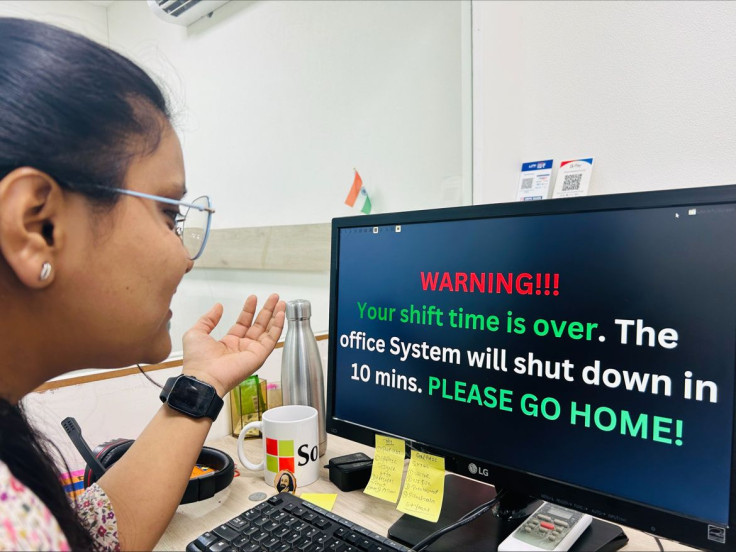'Please Go Home!': Tech Company Shuts Down Computers At 7 PM Every Day For Work-Life Balance
A tech company has come up with an unusual way to ensure that their employees go home right after the end of their shift to maintain a healthy work-life balance.
Every day, employees working in the office of SoftGrid Computers in the central Indian city of Indore in Madhya Pradesh see a warning message flashing on their computer screens when the clock strikes 6:50 p.m.
"Warning!!! Your shift time is over," reads the message, reminding the employees that their office computers will automatically shut down by 7 p.m. The systems then urge the employees to "please go home."
Tanvi Khandelwal, an HR Specialist who works for SoftGrid Computers, told International Business Times that the message aims to tell staffers to "Please go home. Your family and friends are waiting for you."
Khandelwal joined the company in January this year and was surprised when she first saw the message flash across her screen.
"No more calls and emails outside of business hours !! Isn't it fantastic?" Khandelwal wrote in a LinkedIn post about the company's initiative.
Her post resonated with a number of social media users and racked up nearly 500k likes and thousands of comments. While some LinkedIn users said such an effort is not practical in all workplaces, many agreed that SoftGrid Computers' initiative was a quirky way to tackle the "always on" work culture that Indian employees are often subjected to.
"Softgrid hires a human being, not a machine," Khandelwal told International Business Times. "A Machine can work 16 hours but human beings can't."
Due to the employee-friendly work culture at her company, Khandelwal said her employees not only enjoy their work but also show more productivity when they have a healthy work-life balance.
A stressed employee can work 10 to 12 hours a day but may still not be able to deliver the same productivity as a "happy mind" that works for six hours, the HR specialist explained.
"The main thing is that if your mind is healthy, your work will be productive. If your mind is going through stress, you will not deliver productive work," Khandelwal added.
Indian employers often subject their employees to low pay, massive workloads, and a never-ending sense of urgency in their work environment. Consequently, employees often work to the point of exhaustion and also experience burnout.
The World Health Organisation (WHO) said India contributes to 15 percent of the global problem of mental health.
Deloitte Touche Tohmatsu India LLP (DTTILLP) conducted a survey on mental health and released the findings in September 2022. After analyzing responses from 3,995 employees, the survey, titled "Mental health and well-being in the workplace," found that 80 percent of the Indian workforce reported suffering mental health issues in the past year. Despite poor mental health conditions, 33 percent of all respondents continued working, the survey found.
"Mental health has been a real issue," Punit Renjen, Deloitte Global CEO, said about the findings. "The challenges of the past two-plus years have brought conversations about mental health at work to the forefront. This study demonstrates that businesses must prioritize the mental health and well-being of their people."
"It is essential that senior management plays a major role in destigmatizing mental health challenges within their organizations," Renjen continued. "We need to take the necessary steps to create an environment where employees' well-being is prioritized, and they have access to the support they need, so that everyone can thrive"
No stranger to the unreasonable expectations that some employers put on their employees, Khandelwal also admitted that overworking was common at her previous workplaces. She revealed it was a norm for employees to stay back in the office after hours.
"They didn't realize employees were suffering from mental health issues. They want their work only," she said.
"For me, mental health and physical health is very important," she added.
Two months into her new job at SoftGrid Computers, Khandelwal believes she has found a workplace that aligns with the work culture she believes in. "I'm really happy here," she said.

© Copyright IBTimes 2024. All rights reserved.












